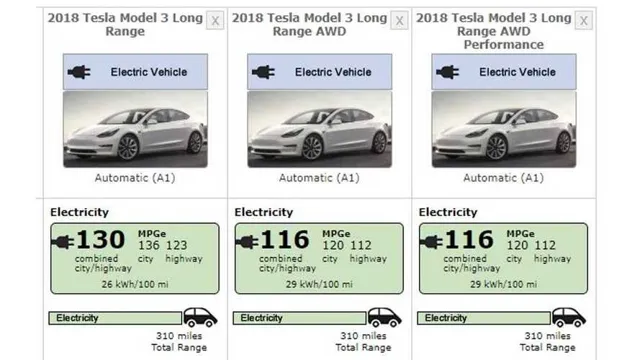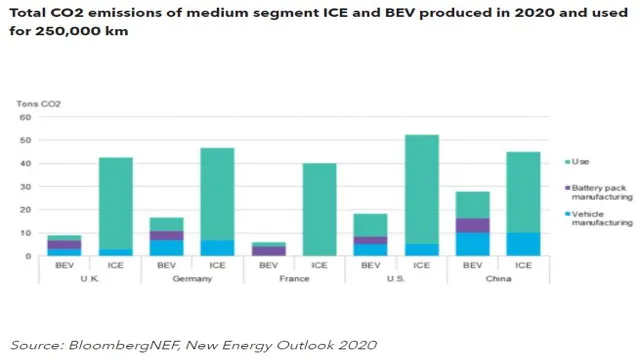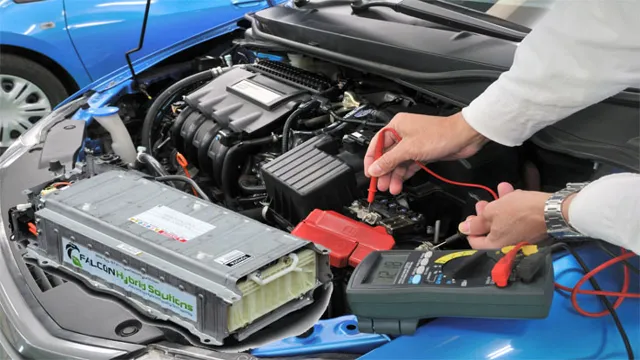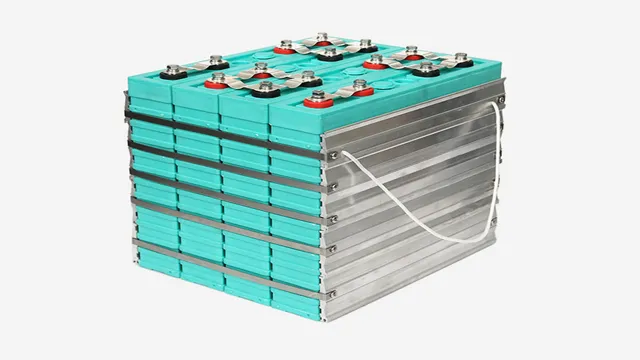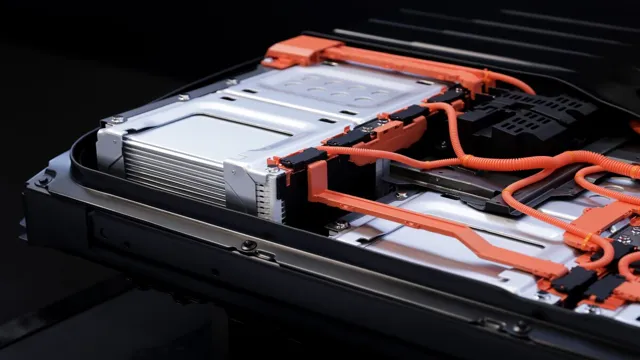Unleashing the Power: Maximizing the Efficiency of Your Electric Car Battery
As the world shifts towards electric vehicles, the efficiency of electric car batteries becomes more critical now than ever before. The battery is the heart of any electric vehicle, and the efficiency of the battery determines the total driving range. The efficiency of electric car batteries is impacted by various factors like battery chemistry, temperature, and driving habits.
The efficiency of an electric car’s battery refers to how much energy can be drawn from it, given a certain charge. This efficiency can be hampered by multiple factors that affect the performance of the battery. The chemistry of the battery plays a critical role in determining the efficiency of the battery.
Different types of batteries like lithium-ion, nickel-metal hydride, and lead-acid batteries offer varying levels of performance. Another significant factor that affects the efficiency of electric car batteries is the temperature. Extreme temperatures can reduce the efficiency of the battery and the driving range of the vehicle.
For instance, electric cars perform differently in cold and hot weather, especially if the temperature falls below 10°C. If the battery is too hot or too cold, it might not work as efficiently as it should. Driving habits also have a significant impact on the efficiency of electric car batteries.
Aggressive driving, high speeds, and frequent accelerating and decelerating can reduce the efficiency of the battery and decrease the vehicle’s range. In conclusion, the efficiency of electric car batteries plays a vital role in the overall performance of the vehicle. The battery’s chemistry, temperature, and driving habits impact the efficiency of the battery.
Therefore, it becomes imperative to ensure that electric car batteries are well-maintained and suitably used, ensuring the maximum driving range possible.
Energy Density of Batteries
When it comes to electric cars, the efficiency of the battery is everything. The energy density of batteries determines how much energy can be stored per unit of volume or mass. The higher the energy density, the more energy can be stored and the longer the vehicle can run on a single charge.
It’s like having a bigger gas tank in a traditional car – you can drive further without needing to refuel. However, higher energy density batteries can also be more expensive and heavier, so finding the right balance is key. Fortunately, advances in battery technology continue to improve energy density, making electric cars more efficient and cost-effective in the long run.
The efficiency of an electric car battery is a crucial factor in determining the viability of electric vehicles as a mainstream mode of transportation, and it’s exciting to see the progress that’s being made.
Comparison of Common Battery Types
When it comes to comparing different types of batteries, one key factor to consider is energy density. Essentially, this refers to how much energy a battery can hold in relation to its weight or volume. Generally, a higher energy density means that a battery can provide more power for longer periods of time.
Of course, energy density is just one factor to consider when choosing a battery type. Other important factors include things like cost, rechargeability, and environmental impact. However, if you’re looking for a battery that can provide strong, reliable power without weighing you down, then energy density is definitely an important factor to keep in mind.
When it comes to comparing different battery types, you’ll find that there is quite a bit of variation in energy density. Lithium-ion batteries, for example, are known for having a relatively high energy density, which is one of the reasons why they are so commonly used in mobile devices like smartphones and laptops. Meanwhile, lead-acid batteries tend to have a lower energy density, which is part of the reason why they are often used in automotive and marine applications where weight is less of a concern.
Overall, the energy density of a battery is an important factor to consider when choosing a battery for your particular needs and applications. By taking the time to research different types of batteries and their energy densities, you can make an informed decision and ensure that you get the best possible performance for your money.
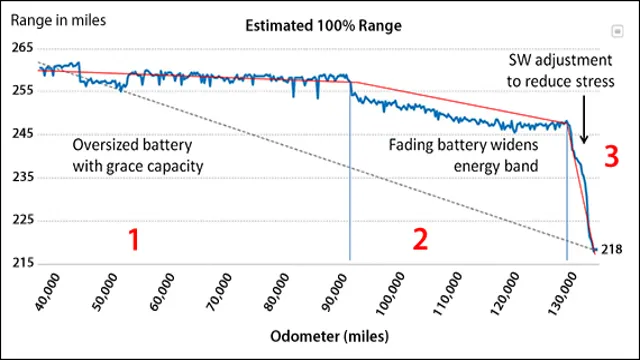
Impact on EV Range
When it comes to electric vehicles (EVs), the energy density of batteries plays a crucial role in determining their range. Energy density refers to the amount of energy that can be stored in a battery per unit of its weight or volume. Simply put, the higher the energy density of a battery, the longer the EV can travel.
This is because a higher energy density battery can store more energy despite being smaller and lighter in weight. With technological advancements, the energy density of batteries has seen significant improvements over the years, which has resulted in an increase in the range of EVs. However, it’s important to note that the energy density also affects the cost of the battery.
A battery with higher energy density tends to be more expensive as it requires more advanced materials and manufacturing processes. Nonetheless, the energy density of the battery remains a critical factor in determining the range of an EV.
Factors Affecting Battery Efficiency
When it comes to electric car batteries, efficiency is a crucial aspect for a satisfying driving experience. Several factors affect the efficiency of a battery, including its age and the environment it operates in. Older batteries generally don’t hold as much charge as newer ones.
Furthermore, the temperature of the battery can have a significant impact on its performance. Colder temperatures can reduce the efficiency of a battery, while hotter environments can cause batteries to degrade quickly. Driving style can also have an effect on battery efficiency.
Aggressive acceleration and braking can drain the battery quicker than a more gentle driving style. In addition, the weight of the car and the driving terrain can also affect battery efficiency. These factors, combined with regular maintenance, play a vital role in obtaining the most out of the electric car battery’s efficiency.
By keeping all these aspects in mind, you can effectively extend your vehicle’s range and save costs on charging. So, before you hit the road, make sure to consider how these various factors can impact your electric car’s battery efficiency.
Temperature and Climate
Temperature can significantly affect the efficiency of batteries. High temperatures can make batteries lose their charge more quickly and affect their overall lifespan. In contrast, extremely low temperatures can also reduce their ability to generate power.
In fact, studies have shown that extreme temperatures (-40°C to +50°C) can decrease battery life by as much as 50%. Therefore, when using any battery-operated device, it’s important to be mindful of the temperature in which it operates. For instance, during colder weather, keeping a battery-operated device in a warm place can help to maintain its efficiency.
Similarly, avoiding leaving such devices in excessively hot environments will help to protect the battery’s overall lifespan. So, it’s essential to keep an eye on the temperature of the battery-operated device to ensure its optimal efficiency and performance.
Driving Habits and Conditions
When it comes to electric vehicle (EV) batteries, there are several factors that can affect their efficiency, including driving habits and conditions. One of the biggest contributors to reduced battery life is aggressive driving behavior. If you’re frequently flooring the accelerator and braking hard, you’re putting more strain on the battery, which can lead to faster degradation over time.
Similarly, extreme weather conditions such as extreme heat or cold can also have a detrimental effect on battery life, as the cells may be overworked in order to maintain an optimal temperature range. In addition, running too many electrical accessories such as air conditioning or radio may put extra demand on the battery and drain it more quickly. To maximize your EV battery efficiency, try to maintain a smooth and steady driving style, avoid extreme temperature swings, and limit the use of unnecessary electrical accessories.
By doing so, you can help ensure that your EV battery lasts for as long as possible and delivers optimal performance throughout its lifespan.
Battery Maintenance
When it comes to battery efficiency, there are several factors that can contribute to its longevity. One major factor is temperature. High temperatures can cause damage to the chemicals inside the battery, which can decrease its efficiency.
Additionally, overcharging or undercharging the battery can also have negative effects on its performance. It’s important to use the appropriate charger for your battery type and to avoid leaving it plugged in for extended periods of time. Proper maintenance and regular use can also help extend the life of your battery.
Regularly cleaning the battery terminals and storing it in a cool, dry place can also help improve its efficiency. It’s always best to consult the manufacturer’s recommendations for your specific battery type to ensure its proper care and maintenance. By taking these steps, you can help ensure your battery operates at its highest level of efficiency for as long as possible.
Future of Electric Car Batteries
As the demand for eco-friendly vehicles continues to grow, the efficiency of an electric car battery becomes increasingly important. The future of electric car batteries is focused on improving the energy density and reducing the cost. This means that manufacturers are striving to find ways to store more energy in a smaller space with fewer materials.
The key to achieving this is by developing new materials or improving existing ones. Lithium-ion batteries, which are the most commonly used batteries in electric vehicles, have seen significant progress in their energy density over the past decade. However, there is always room for improvement.
One way to improve the efficiency of the battery is by using solid-state technology, which replaces the liquid electrolyte with a solid. This provides better performance and safety, as well as a longer lifespan. The advancements in electric car batteries will eventually enable us to drive further on a single charge, making electric cars more accessible and practical for everyone.
Advancements in Battery Technology
Electric car batteries are advancing rapidly, and the future looks promising for the industry. Current developments in battery technology are allowing for higher energy density, longer lifespan, and faster charging times. Lithium-ion batteries have been the go-to for electric cars, but solid-state batteries have the potential to be even better.
With their ability to reduce weight and size, provide higher energy density, and mitigate the risk of explosions, solid-state batteries could revolutionize the electric car industry. Other advancements in battery tech include flow batteries, which use liquid electrolytes and can be refilled like gasoline, and sodium-ion batteries, which use a much cheaper and more abundant material than lithium. As batteries continue to evolve, the range of electric cars will improve, charging times will decrease, and prices will become more affordable.
The future of electric car batteries is bright, and it’s exciting to see what new breakthroughs will emerge.
Potential for Sustainable Materials
Electric car batteries have the potential to make a great impact on the environment. In fact, as technologies advance, so does the potential for sustainable materials to be used in their manufacturing. With the push for electric vehicles and renewable energy sources, the demand for batteries that can store large amounts of energy is growing.
Lithium-ion batteries have been the go-to solution for electric car manufacturers, however, they come with their own set of problems such as being expensive to produce and containing toxic components. This is where sustainable materials come in – the future of electric car batteries is heading in the direction of using materials that not only provide enough energy but are also environmentally friendly, reusable, and require less energy to produce. Companies are already working on developing batteries that use metal-free electrodes and solid-state electrolytes to substantially reduce the environmental footprint of battery production.
As the technology advances, it is important to continue researching and developing sustainable alternatives that can replace lithium-ion batteries and revolutionize the future of electric cars.
Conclusion
In conclusion, the efficiency of an electric car battery is like having a superhero power source for your vehicle. Not only does it provide clean and sustainable energy, but it also offers incredible range and performance. It’s like having Iron Man’s arc reactor at your fingertips, allowing you to zoom past gas-guzzling competitors without breaking a sweat.
So if you’re looking for a smarter and more efficient mode of transportation, look no further than the electric car battery – the ultimate superhero power source for the eco-conscious driver.”
FAQs
How efficient is an electric car battery compared to a traditional gasoline-powered car?
Electric car batteries are significantly more efficient than gasoline-powered car engines, with up to 90% of the energy from the battery converted into motion, compared to just 20% for gasoline engines.
How does the efficiency of an electric car battery differ in cold weather?
In extremely cold temperatures, the efficiency of an electric car battery can decrease due to slower chemical reactions. However, many electric car manufacturers have developed cold-weather packages to help mitigate this issue.
Can the efficiency of an electric car battery be improved through regenerative braking?
Yes, electric car batteries can be made more efficient through the use of regenerative braking. This system captures energy that would otherwise be lost during braking and returns it to the battery for later use.
How does the size of an electric car battery impact its efficiency?
Generally speaking, larger electric car batteries tend to be more efficient as they can store more energy. However, it’s important to note that bigger batteries also weigh more, which can reduce overall efficiency.

